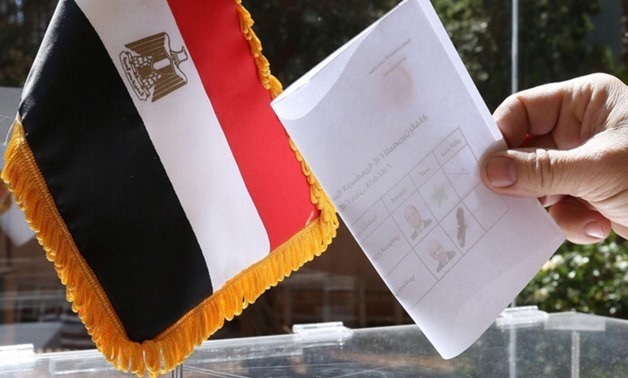
Egyptian national residing in Lebanon casts his vote in his country's presidential elections at a polling station at the Egyptian embassy in Beirut on May 15, 2014 – AFP
CAIRO - 14 March 2018: Egypt’s National Elections Authority (NEA) has obligated all of the international diplomatic missions that will supervise the upcoming presidential election abroad to keep all documents related to the election and voting process, including polling cards, for a certain period, estimated to be at least four years after the election.
NEA’s decision No. 18 for 2018 states that every mission and consulate should keep copies of all the procedures documents, voters' names lists, polling cards and submitted appeals against the election’s final results.
About 9.5 million Egyptians eligible to participate in the upcoming presidential election are getting ready to cast their ballots on March 16, 17 and 18 in 124 countries all over the world in their respective embassies, consulates and diplomatic missions. Only four countries will be excluded due to political reasons: Syria, Yemen, Libya and Somalia.
The actual number of Egyptians abroad could exceed the announced number by the Central Agency for Public Mobilization and Statistics (CAPMAS), which is 9.5 million, according to Minister of Immigration Nabila Makram. This is mainly because “there are a number of Egyptians currently living outside; however, their data is not registered with the embassies,” Makram said during an interview with MENA news agency in February.
“During my tour to meet with Egyptian communities abroad, they expressed their keenness to participate in the political process at any time. Their enthusiasm exceeded my expectations,” Makram added during her interview.
The Ministry of Foreign Affairs will be monitoring the election process live during the three days, along with the NEA, especially in the countries that have the largest number of Egyptian communities, such as Britain, the United States of America, France and the Arab countries.
Starting March 14, the “electoral silence” period will commence for election abroad. In the two following days, March 14 and 15, no presidential propaganda will be allowed.
Domestically, voting will take place for three days starting March 26. The winning candidate will be announced on April 2. Sixty million eligible voters are expected to cast their ballots in the election.
In February, the NEA announced the final list of candidates, including current President Abdel Fatah al-Sisi and head of al-Ghad Party Moussa Moustafa Moussa. Sisi chose a star as his symbol in the election, while Moussa chose a plane.
Sixty-two national and international non-governmental and civil society organizations will observe the 2018 Egyptian election, according to the regulations of Law no. 8 of 2018, issued by the NEA.


Comments
Leave a Comment